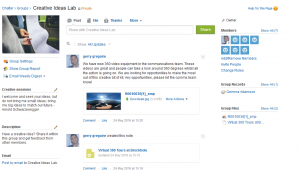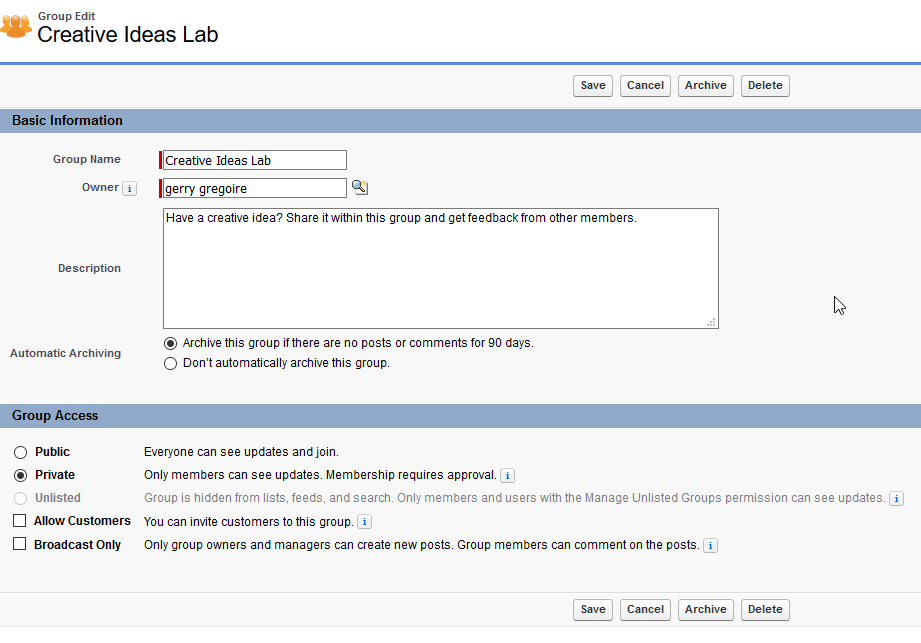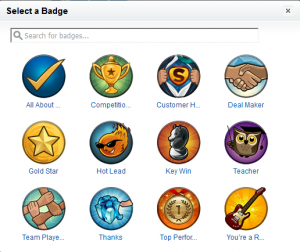Improve business communication with Salesforce Chatter
3 ways Salesforce Chatter can help improve internal & external communication within your business
So I’ve been working on a project that involves rolling out Salesforce Chatter to an entire organisation of 200 employees.
If you are unfamiliar with what Salesforce Chatter is, it’s a communication tool within Salesforce.com. It allows for instant feedback, file sharing, collaboration through groups, the utilisation of polls and also a nifty employee recognition feature called ‘badges’, which can be awarded when a user deserves a well-earned pat on the back.
However, despite benefits Chatter can provide, I’ve noticed that a number of businesses are still tentative when deciding whether or not to implement the feature.
I’m hoping that a few use cases and a brief look at some of the benefits will give you some insight into how Chatter can elevate your business.
1. Chatter Groups allow users to collaborate, be more responsive and get the information they need quickly.

You have the ability to setup various groups that focus on various topics. These groups can be private or public and allow users to collaborate and share information and data.
For example, you could create a group solely about ‘Creative ideas’. Employees of your business could share inspirational ideas that they feel would add value to the business. Other users could feedback to them instantly; the idea could develop and become a reality.
If you have two competing ideas for a particular campaign, you could even launch the poll feature within Chatter to get users to vote which idea they feel is best.
You could argue that Chatter then is a feature that promotes continuous improvement, allowing your people to continually share ideas, their thoughts on improvements and potential business weaknesses that need to be addressed quickly and efficiently.
A quick note about Group settings:
Groups can be set to private (only members can see updates) or public (everyone can see updates).

You also have the ability to add external customers to a group. This is an option you must enable in the group settings but i think it’s a nifty feature. Say for example you created a group for key customers where you continually provided them with updates on service changes, changes in personnel and perhaps even some light hearted news; you are essentially solidifying your customer relationships through a more fluid communication channel.
Note: When you invite someone as a customer to your group, they are given a unique username and password to log in to the group and they only see group related information and not your object record data.
2. Chatter allows organisations to recognise great work & boost morale through ‘badges’

At first glance, It may seem quite patronizing to ‘award someone a badge’ for good work, but the fact is, most people actually appreciate positive recognition.
I actually really love this feature. The fact that you can than ‘thank’ other users and highlight why they are being recognised through using a badge, is a really neat idea in terms of boosting employee morale and communicating recognition throughout the organisation.
You can also add your own custom designed badges so you’re not restricted to using the default ones provided by Salesforce (shown in the picture above).
3. Follow important records you want to keep a close eye on

Salesforce Chatter allows you to ‘follow’ any record that your administrator has enabled for Chatter, such as opportunities, contacts, accounts or custom objects you create.
This is great for keeping up to date with changes to records that matter to you. Let’s say for example you have ten golden accounts which you have nurtured over several years. The chances are, you want to keep up to date with all activity on that account. So, when one of your colleagues logs a call made on the account, you’re notified instantly within your feed. There’s no more being out of the loop or not knowing about a certain piece of correspondence that’s been sent to an account you manage— it’s all there to be seen.
Again, this kind of fluid communication arms your employees with Knowledge. Knowledge they say is power, or what i like to call ‘good business practice’.
That’s just a quick overview of some of my favourite features of chatter, however if you want to learn more, you can check out the chatter guide.
Like it? Share it

